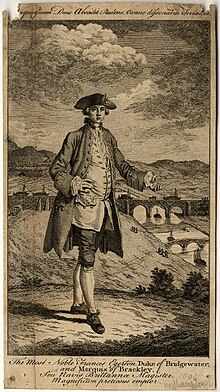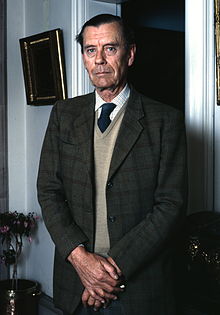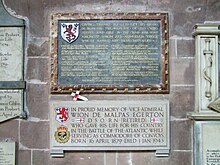| This article includes a list of general references, but it lacks sufficient corresponding inline citations. Please help to improve this article by introducing more precise citations. (July 2015) (Learn how and when to remove this message) |

The Egerton family (pronunciation: "edge-er-ton") is a British aristocratic family. Over time, several members of the Egerton family were made Dukes, Earls, knights, baronets and peers. Hereditary titles held by the Egerton family include the dukedoms of Bridgewater (1720–1803) and Sutherland (since 1963), as well as the earldoms of Bridgewater (1617–1829), Wilton (1801–1999) and Egerton (1897–1909). Several other members of the family have also risen to prominence. The Egerton family motto is Virtuti non armis fido ("I put my faith in valour not arms").
History




The Egertons are an ancient Cheshire family, seated at Oulton Park near Tarporley since the Middle Ages. An ancestor of the 1st Baronet, William le Belward, took the surname of Egerton from the lordship of Egerton, which he inherited. In 1617, Roland Egerton was created a baronet (see Grey Egerton baronets). He later represented Wootton Bassett in Parliament and married Bridget, sister and co-heir of Thomas Grey, 15th Baron Grey de Wilton. In 1784, the 7th Baronet was created Baron Grey de Wilton and in 1801 he was further created Viscount Grey de Wilton and Earl of Wilton. These titles were created with special remainder to the second and the younger sons successively of his daughter Lady Eleanor Egerton, who married Robert Grosvenor, 1st Marquess of Westminster. On Lord Wilton's death in 1814 the barony became extinct, while he was succeeded in the viscountcy and earldom according to the special remainder by his grandson Thomas Grosvenor (1799–1882), who assumed the surname of Egerton. The Grey Egerton baronetcy passed to a distant relative, the 8th Baronet. The ninth Baronet was in 1825 granted by Royal Warrant the right to assume for themselves only the additional surname of Grey and the arms and supporters of Grey de Wilton. The viscountcy and earldom of Wilton continued to descend in this branch of the family until the death of the 7th Earl in 1999. When he died without children, his titles passed to Francis Grosvenor, 6th Baron Ebury (b. 1934), a descendant of Robert Grosvenor (1801–1893), 1st Baron Ebury, the third son of Robert Grosvenor, 1st Marquess of Westminster and his wife Eleanora Egerton, daughter of the 1st Earl of Wilton.
From another branch of the family, Thomas Egerton (1540–1617) held the office of Lord Chancellor from 1603 to 1617; he was created Baron Ellesmere in 1603 and Viscount Brackley in 1616. The 2nd Viscount (1579–1649) was created Earl of Bridgewater in 1617 and the 4th Earl (1681–1745) was made Duke of Bridgewater in 1720. On the death of the 3rd Duke (1736–1803), the dukedom became extinct. The 3rd Duke of Bridgewater was buried in the Egerton family vault in Little Gaddesden Church, close to Ashridge. The earldom of Bridgewater passed on to the late Duke's cousin John Egerton (1753–1823), who became the 7th Earl. The earldom of Bridgewater eventually became extinct on the death of his younger brother, the 8th Earl, in 1829. On the death of the 3rd Duke of Bridgewater in 1803, his substantial estates were inherited by Lord Francis Leveson-Gower, second son of 1st Duke of Sutherland. He was the grandson of Lady Louisa Egerton, daughter of the 1st Duke of Bridgewater. Lord Francis Leveson-Gower assumed by Royal licence the surname of Egerton in lieu of his patronymic and was created Viscount Brackley and Earl of Ellesmere in 1846. The 5th Earl of Ellesmere(1915–2000) succeeded as 6th Duke of Sutherland in 1963.
After a lengthy lawsuit, the 8th Earl of Bridgewater's estates were inherited by John Egerton-Cust, 2nd Earl Brownlow, great-great-grandson of Lady Amelia Egerton, sister of the seventh and eighth Earls of Bridgewater. However, he died childless at an early age and was succeeded by his younger brother, the 3rd Earl Brownlow, who retained his original family surname of Brownlow-Cust.
The Barons and Earls Egerton were members of another branch of the family, descended from William Tatton (who assumed the surname of Egerton in lieu of his patronymic), husband of Hester, granddaughter of the Hon. Thomas Egerton, youngest son of the 2nd Earl of Bridgewater.
Members of the family
Grey Egerton branch
Egerton baronets (1617)
Main article: Grey Egerton baronets- Sir Roland Egerton, 1st Baronet (died 1646)
- Sir John Egerton, 2nd Baronet (died 1674)
- Sir John Egerton, 3rd Baronet (c. 1658–1729)
- Sir Holland Egerton, 4th Baronet (c. 1689–1730)
- Sir Edward Egerton, 5th Baronet (c. 1719–1744)
- Sir Thomas Grey Egerton, 6th Baronet (c. 1721–1756)
- Sir Thomas Grey Egerton, 7th Baronet (1749–1814) (created Baron Grey de Wilton in 1784 and Earl of Wilton in 1801)
- Sir John Grey Egerton, 8th Baronet (1766–1825)
- Sir Philip Grey Egerton, 9th Baronet (1767–1829)
- Sir Philip de Malpas Grey Egerton, 10th Baronet (1806–1881)
- Sir Philip le Belward Grey Egerton, 11th Baronet (1833–1891)
- Sir Philip Henry Brian Grey-Egerton, 12th Baronet (1864–1937)
- Sir Brooke de Malpas Grey Egerton, 13th Baronet (1845–1945)
- Sir Philip Reginald le Belward Grey Egerton, 14th Baronet (1885–1962)
- Sir (Philip) John Caledon Grey Egerton, 15th Baronet (1920–2008)
- General Sir David Boswell Egerton, 16th Baronet (1914–2010)
- Sir William de Malpas Egerton, 17th Baronet (born 1949)
The heir apparent is the present holder's son Matthew Robert Egerton (born 1977).
Barons Grey de Wilton (1784)
- Thomas Egerton, 1st Baron Grey de Wilton (1749–1814) (created Earl of Wilton in 1801)
- succeeded as Earl of Wilton according to the special remainder by his grandson Thomas (1799–1882)
Earls of Wilton (1801)

- Other titles: Viscount Grey de Wilton (1801)
- Thomas Egerton, 1st Earl of Wilton (1749–1814)
- Thomas Egerton, 2nd Earl of Wilton (1799–1882)
- Arthur Grey Egerton, 3rd Earl of Wilton (1833–1885)
- Seymour John Grey Egerton, 4th Earl of Wilton (1839–1898)
- Arthur George Egerton, 5th Earl of Wilton (1863–1915)
- Seymour Edward Egerton, 6th Earl of Wilton (1896–1927)
- Seymour William Egerton, 7th Earl of Wilton (1921–1999) who died without children after which the earldom passed to Francis Grosvenor, 6th Baron Ebury.
- Francis Egerton Grosvenor, 8th Earl of Wilton, 6th Baron Ebury (b. 1934)
The heir apparent is the present holder's only son Julian Francis Martin Grosvenor, Viscount Grey de Wilton (b. 1959)
Bridgewater branch
Barons Ellesmere (1603)

- Thomas Egerton, 1st Baron Ellesmere (1540–1617) (created Viscount Brackley in 1616)
- Merged with title of Earl of Bridgewater in 1617
Viscounts Brackley (1616)
Main article: Viscount Brackley- Thomas Egerton, 1st Viscount Brackley (1540–1617)
- John Egerton, 2nd Viscount Brackley (1579–1649) (created Earl of Bridgewater in 1617)
- Merged with title of Earl of Bridgewater in 1617
Earls of Bridgewater (1617)
- Other titles: Baron Ellesmere (1603), Viscount Brackley (1616)
- John Egerton, 1st Earl of Bridgewater (1579–1649)
- John Egerton, 2nd Earl of Bridgewater (1623–1686)
- John Egerton, 3rd Earl of Bridgewater (1646–1701)
- Scroop Egerton, 4th Earl of Bridgewater (1681–1745) (created Duke of Bridgewater in 1720)
- John Egerton, 2nd Duke, 5th Earl of Bridgewater (1727–1748)
- Francis Egerton, 3rd Duke, 6th Earl of Bridgewater (1736–1803)
- John William Egerton, 7th Earl of Bridgewater (1753–1823)
- Francis Henry Egerton, 8th Earl of Bridgewater (1756–1829)
Dukes of Bridgewater (1720)
- Other titles: Marquess of Brackley (1720)

- Scroop Egerton, 1st Duke of Bridgewater (1681–1745)
- John Egerton, 2nd Duke of Bridgewater (1727–1748)
- Francis Egerton, 3rd Duke of Bridgewater (1736–1803)
Earl of Ellesmere (1846)
- Other titles: Viscount Brackley (1846)
- Francis Egerton, 1st Earl of Ellesmere (1800–1857)
- George Granville Francis Egerton, 2nd Earl of Ellesmere (1823–1862)
- Francis Charles Granville Egerton, 3rd Earl of Ellesmere (1847–1914)
- John Francis Granville Scrope Egerton, 4th Earl of Ellesmere (1872–1944)
- John Sutherland Egerton, 5th Earl of Ellesmere (1915–2000) (succeeded as Duke of Sutherland in 1963)
Duke of Sutherland (1833)
Main article: Duke of Sutherland
- John Sutherland Egerton, 5th Earl of Ellesmere (1915–2000), succeeded as 6th Duke of Sutherland in 1963, died without issue
- Francis Ronald Egerton, 7th Duke of Sutherland (b. 1940), first cousin once removed of the 6th Duke
The heir apparent is the present holder's eldest son, James Granville Egerton, Marquess of Stafford (b. 1975). He has four daughters. The second in line is Lord Henry Alexander Egerton (b. 1977), younger son of the 7th Duke, who has three daughters.( Reference ;- Debretts Peerage 2019 Edition)
Succession to the dukedom
Order of succession
- James Granville Egerton, Marquess of Stafford (b. 1975). Elder son of the 7th Duke
- Lord Henry Alexander Egerton (b. 1977). Younger son of the 7th Duke
- Simon Francis Cavendish Egerton (b. 1949, see below). Great-great-great-grandson of the 1st Earl of Ellesmere through his second son Francis (1824-1895).
- Nicholas Egerton (b. 1967, see below). Son of Michael Egerton (1924-1979), the younger brother of Anthony Egerton (1921-1985).
- Frank Egerton (b. 1959, see below). Son of David Egerton (1930-2012)
Genealogy of succession
- Francis Egerton, 1st Earl of Ellesmere (1800–1857), had issue, including:
- George Granville Francis Egerton, 2nd Earl of Ellesmere (1823–1862), from whom the present Duke descends.
- Admiral Francis Egerton (1824–1895), who had issue, including:
- William Francis Egerton (1868–1949), who had a son:
- Captain Francis Egerton (1896–1935). He had issue, including three sons:
- Anthony Francis Egerton (1921–1985). He had two sons:
- Simon Francis Cavendish Egerton (b. 1949, currently 3rd in line of succession)
- Fulke Charles Granville Egerton (1952–2017), Debretts Peerage (2019 Edition)
- Michael Godolphin Egerton (1924–1979), who had three sons:
- Mark William Godolphin Egerton (1958–2005)
- Robin Michael Bowring Egerton (1962–1988)
- Nicholas Egerton (b. 1967, currently 4th in line of succession)
- David William Egerton (1930–2012), who had a son:
- Francis David Egerton (b. 1959, currently 5th in line of succession)
- Anthony Francis Egerton (1921–1985). He had two sons:
- Captain Francis Egerton (1896–1935). He had issue, including three sons:
- William Francis Egerton (1868–1949), who had a son:
Tatton branch

This branch of the Egerton family descended in the female line from the Hon. Thomas Egerton, of Tatton Park in Cheshire, the youngest son of John Egerton, 2nd Earl of Bridgewater. His granddaughter Hester (died 1780) married William Tatton, and in 1780 they assumed by Royal licence the surname of Egerton in lieu of Tatton. In 1859 William Egerton (1806–1883), a major landowner in the Manchester area, was created Baron Egerton. He was succeeded by his eldest son Wilbraham (1832–1909), who was created Viscount Salford and Earl Egerton in 1897. On his death in 1909 the viscountcy and earldom became extinct. He was succeeded in the barony by his younger brother, the 3rd Baron Egerton (1845–1920). When he died the titles passed to his son, Maurice Egerton, the fourth Baron. Maurice did not marry and on his death in 1958 the barony became extinct, and Tatton Park was given to the National Trust.
Barons Egerton (1859)
Main article: Baron Egerton- William Tatton Egerton, 1st Baron Egerton (1806–1883)
- Wilbraham Egerton, 2nd Baron Egerton (1832–1909) (created Earl Egerton in 1897)
- Alan de Tatton Egerton, 3rd Baron Egerton (1845–1920)
- Maurice Egerton, 4th Baron Egerton (1874–1958)
Earl Egerton (1897)
- Wilbraham Egerton, 1st Earl Egerton (1832–1909)
Other notable members


Several other members of the Egerton family have also gained distinction:
Sir Ralph Egerton (died 1528), was the standard bearer for King Henry VIII
Caledon Richard Egerton, fifth son of the ninth Baronet, was a Major-General in the British Army. His third son, Sir Charles Comyn Egerton, was a Field Marshal in the British Army. His son Wion de Malpas Egerton (1879–1943), a Vice-Admiral in the Royal Navy, was killed in action in the Second World War. His son Sir David Egerton (1914–2010), a Major-General in the Royal Artillery, was awarded the Military Cross and later succeeded as sixteenth Baronet in 2008. Sir Reginald Arthur Egerton, another son of the aforementioned Major-General Caledon Egerton (died 1930), was Private Secretary to the Postmaster-General, Surveyor to the General Post Office, London and Secretary-General to the GPO, Dublin.
Admiral Sir George Egerton, KCB (1852 – 1940) was a senior Royal Navy officer who rose to become Second Sea Lord. He was a grandson of The Rev Sir Philip Grey-Egerton, 9th Baronet.
Henry Egerton (died 1746), a younger son of John Egerton, 3rd Earl of Bridgewater, was a clergyman. He was Bishop of Hereford between 1723 and his death in 1746. He married Lady Elizabeth Adriana, daughter of William Bentinck, 1st Earl of Portland. Their son, John Egerton, became Bishop of Durham and was the father of the seventh and eighth Earls of Bridgewater.
Sir Stephen Loftus Egerton (1932–2006) (son of William le Belward Egerton, son of William Egerton, son of Philip Henry Egerton, son of William Egerton, third son of Philip Egerton, father of the eighth and ninth Baronets), was a prominent diplomat; he served as HM Ambassador to Iraq from 1980 to 1982 and Ambassador to Saudi Arabia from 1986 to 1989.
Sir Robert Eyles Egerton (1827–1912), youngest son of William Egerton, third son of Philip Egerton, father of the eighth and ninth Baronets, was Lieutenant-Governor of the Punjab. His son Sir Raleigh Gilbert Egerton (1860–1931) was a Lieutenant-General in the British Army.
Rowland Egerton-Warburton (1804–1891) was a landowner from in Cheshire; he was the eldest son of Rev. Rowland Egerton BA and his wife, Emma. His father was the seventh son of Philip Egerton, the 9th baronet of Egerton and Oulton. Through his mother he inherited Arley and Warburton. He rebuilt Arley Hall and its chapel, and helped to improve the village of Great Budworth. His younger brother, Colonel Peter Egerton-Warburton, CMG (1813–1889) settled in Australia; one of his descendants is Richard Egerton-Warburton, AO LVO, while another branch founded the Mount Barker winery in Western Australia.
References
- Debrett's Peerage, 1968, p.1077, ASIN: B00NISIWNI
- "Taron Egerton's name is pronounced…". YouTube. Retrieved 12 June 2020.
- Dale, F. Latin Words, Phrases, Mottoes, Quotations in common English Usage. Ginn and Company Ltd. p. 26.
- "Complete baronetage". Retrieved 25 July 2015.
- "Bridgewater Chapel". Littlegaddesdenchurch.org.uk. Retrieved 25 July 2015.
- "Archive from". the Lancashire Telegraph. 8 October 1999. Retrieved 25 July 2015.
- ^ "Person Page 1511". Thepeerage.com. 2 December 2008. Retrieved 25 July 2015.
- Richard Francis E. Egerton-Warburton. "Richard Francis E. Egerton-Warburton AO, LVO, FAICD: Executive Profile & Biography - Businessweek". Bloomberg.com. Retrieved 25 July 2015.
- "About Us - Mount Barker Wines". Mountbarkerwine.com.au. Retrieved 25 July 2015.
External links
- Egerton Bridgewater Mausoleum
- Egerton family: Little Gaddesden
- Little Gaddesden and Egerton family
- The Gaddesden Society Parochial Parish Church
- St. Peter and St. Paul, Little Gaddesden
- Egerton of Tatton Muniments, John Rylands Library, University of Manchester.